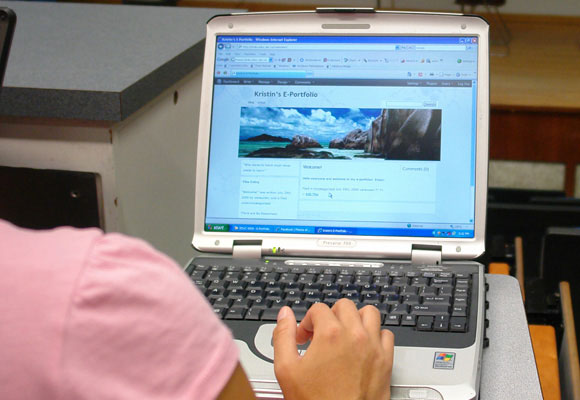For the second consecutive year, teacher candidates enrolling in the Faculty of Education’s teacher education program are building e-portfolios for personal, academic and professional purposes using WordPress MU (a blogging software). The project began some years ago, originally using diverse platforms to host the e-portfolio. But last year, all graduating teachers completed this mandatory assignment using the same platform. Through collaboration among three partners—the Centre for Teaching, Learning and Technology (CTLT), Computing & Media Services (CMS) of the Faculty of Education, and the Teacher Education Office (TEO) — WordPress was chosen to host the e-portfolios, modified to adapt to the program’s needs, and installed in a local server.
 Unlike the e-portfolios developed by the School of Nursing, the teacher education e-portfolios are not used to track students’ clinical progress. Rather, teacher candidates are encouraged to collect artifacts and written corresponding reflections from their course work and practica which they later co-relate to the professional standards of practice established by the BC College of Teachers. At the conclusion of the program, all graduating teachers enroll in an intense Capstone course to assess their professional growth in consultation with their peers and their instructors, and to develop, for faculty records, the aspect of their e-portfolios that relates explicitly to the standards of the profession. These standards-related e-portfolios are then captured by the CMS in confidential e-files (and stored on a WordPress blog) and filed along with the graduates’ final transcripts and reports, for five years. In the meantime, graduates can continue to develop and revise their WordPress MU e-portfolios on the Education e-portfolio server for a year (currently) following graduation.
Unlike the e-portfolios developed by the School of Nursing, the teacher education e-portfolios are not used to track students’ clinical progress. Rather, teacher candidates are encouraged to collect artifacts and written corresponding reflections from their course work and practica which they later co-relate to the professional standards of practice established by the BC College of Teachers. At the conclusion of the program, all graduating teachers enroll in an intense Capstone course to assess their professional growth in consultation with their peers and their instructors, and to develop, for faculty records, the aspect of their e-portfolios that relates explicitly to the standards of the profession. These standards-related e-portfolios are then captured by the CMS in confidential e-files (and stored on a WordPress blog) and filed along with the graduates’ final transcripts and reports, for five years. In the meantime, graduates can continue to develop and revise their WordPress MU e-portfolios on the Education e-portfolio server for a year (currently) following graduation.
This project has evolved considerably over the last year, supported through a series of Teaching and Learning Enhancement Fund (TLEF) grants. These grants enabled the teacher education program to employ 50 teacher candidates as e-coaches. E-coaches learn to use WordPress and subsequently teach the technological aspect of e-portfolio development to their peers. They are invaluable for supporting both teacher candidates and Faculty in the use of WordPress MU. The terms of our funding also required us to seek on-going feedback from e-coaches, instructors and teacher candidates regarding the assignment and teacher candidates’ relationship to it. In response to this feedback, the TEO, CTLT and CMS have continued to develop on-line resources for teacher candidates and instructors alike.
Feedback from graduating teachers on the e-portfolio project has been mixed. A survey of 400 graduates revealed that most felt it was very valuable. About 10% found the project to be frustrating at times. For example, one student noted that they “enjoyed the e-portfolio project once [they] understood the assignment and accepted the limitations of WordPress.” The student added that it was “good for self-reflection after completing the practicum” but, “as someone who is quite comfortable with technology, I found WordPress extremely limiting and frustrating to format or personalize”. Several experienced adult educators who were up-grading, and had no experience with technology, commented on the project with considerable relief. One remarked, “this was one of my favourite projects of the program. I found the WordPress platform easy to use and enjoyed reflecting on my experiences”. Another said, “I would recommend the implementation of e-portfolio projects to trace the progress and development of professional growth”.
The assignment itself, addressing the standards of the profession, also received mixed reviews. A few teacher candidates were critical, but we found this was provoked in some cases by our inability to present the assignment meaningfully and consistently. Resistance also stemmed from some graduates’ frustration with not being able to submit the completed project as documentation for job interviews. Still, we found that generally, teacher candidates appreciated the opportunity to consider their relationship to the expectations of their chosen profession. One student commented, “this is a good way to make teacher candidates aware of the standards and their meaning”.
Our resources, developed in response to teacher candidate feedback, and examples of successful and effective e-portfolios by UBC’s Teacher Candidates can be found here.
For more information, contact:
Anne Scholefield, TEO: anne.scholefield@ubc.ca
Michael Shephard, CMS: michael.shephard@ubc.ca


[…] (2010) e-Portfolios for teacher candidates Vancouver BC: UBC Faculty of Education (retrieved from https://ctlt.ubc.ca/2009/09/22/e-portfolios-for-teacher-candidates/, December 6, […]